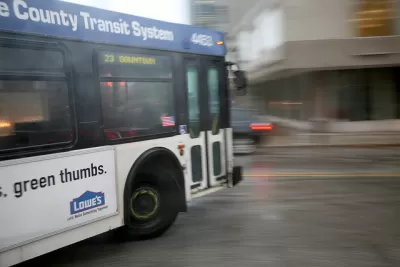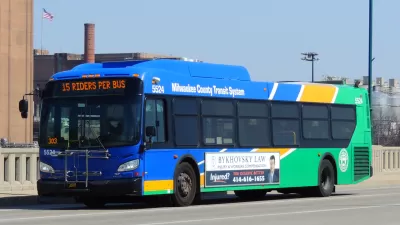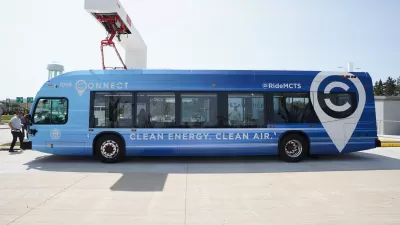Funding for two routes is running out soon, but many workers depend on this service to access jobs outside of the city.

Bruce Murphy writes about the latest on two Milwaukee bus lines, known as the “Job Lines," that connect workers in the city to jobs in outlying suburbs and exurbs. The routes were created in 2014 with the $13.5 million settlement of a lawsuit alleging that planning for the Zoo Interchange expressway did not consider the travel needs of residents from Milwaukee’s low-income and minority communities.
“But the money would cover just four years and is running out at the end of December. So those two bus lines, Route 6 and Route 61, are about to be discontinued. And now no one seems to have a solution to the issue,” says Murphy.
The UW-Milwaukee Center for Economic Development has released a new study showing that the majority of riders on these routes are African American and from the lowest-income parts of the city. Most are also transit-dependent riders traveling to jobs along the routes.
Still, Milwaukee County Transit System officials say that the routes are not cost effective enough to continue and that Route 61 can be replaced with an extension of another line. Murphy also notes that Route 61 extends into two adjacent counties that do not help fund the line, and the three counties have not worked together to try to keep it running.
Murphy also says that companies on along those routes need workers, but they are unlikely to advocate for the bus lines or work to provide private transportation to their employees. “At a time of very low unemployment, the biggest losers may actually be the employers. But long-term the separation between workers and companies in the metro area will continue to retard economic development and stall progress in the Milwaukee region,” says Murphy.
FULL STORY: Black Workers Losing Transit to Jobs?

Maui's Vacation Rental Debate Turns Ugly
Verbal attacks, misinformation campaigns and fistfights plague a high-stakes debate to convert thousands of vacation rentals into long-term housing.

Planetizen Federal Action Tracker
A weekly monitor of how Trump’s orders and actions are impacting planners and planning in America.

San Francisco Suspends Traffic Calming Amidst Record Deaths
Citing “a challenging fiscal landscape,” the city will cease the program on the heels of 42 traffic deaths, including 24 pedestrians.

Defunct Pittsburgh Power Plant to Become Residential Tower
A decommissioned steam heat plant will be redeveloped into almost 100 affordable housing units.

Trump Prompts Restructuring of Transportation Research Board in “Unprecedented Overreach”
The TRB has eliminated more than half of its committees including those focused on climate, equity, and cities.

Amtrak Rolls Out New Orleans to Alabama “Mardi Gras” Train
The new service will operate morning and evening departures between Mobile and New Orleans.
Urban Design for Planners 1: Software Tools
This six-course series explores essential urban design concepts using open source software and equips planners with the tools they need to participate fully in the urban design process.
Planning for Universal Design
Learn the tools for implementing Universal Design in planning regulations.
Heyer Gruel & Associates PA
JM Goldson LLC
Custer County Colorado
City of Camden Redevelopment Agency
City of Astoria
Transportation Research & Education Center (TREC) at Portland State University
Jefferson Parish Government
Camden Redevelopment Agency
City of Claremont





























